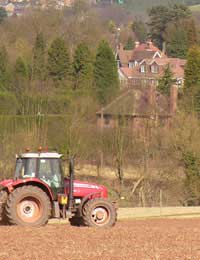Greenhouse Gases and GM Foods

When you think about farming, you might imagine that all of that lush green space and those sprawling fields of crops are harmless to the environment. If anything, you may see them as contributing to a more environmentally friendly world.
Farming and the Environment
The truth, however, is far from a benign one. Farming actually affects global warming more than the collective result of the world's vehicles, trains, boats and aeroplanes. Rather than carbon being the culprit, the main issue is nitrogen.Nitrogen fertiliser is a greenhouse gas. Yet now, there are suggestions about the best way to reduce greenhouse gases produced by farming practices.
Reducing Greenhouse Gases
One school of thought is that genetically modified (GM) crops could ultimately reduce the nitrogen aspect of farming. By modifying crops so that they don't need as much fertiliser, greenhouse gases could potentially be reduced. Some scientists believe that GM crops can truly be ecologically friendly ones.However, GM crops are far from being a globally accepted technology, which means that even with significant, positive results, it will take a lot of education and convincing to fully 'sell' the product to the public.
Nitrogen Efficiency
Since yields of crops typically require very large amounts of nitrogen fertiliser, the idea is to reduce the use of the fertiliser by engineering a crop that thrives without the vast quantities. The production usually ends up giving off enormous quantities of carbon dioxide. On top of that, the nitrogen also causes contamination to soil and water.In fact, atmospheric nitrous oxide has gone up almost twenty percent due to modern agricultural methods. This rise has been triggered by nitrogen fertiliser, which then leads to greenhouse gases. It's a difficult issue because farming is such a mainstay for all of us. It's not as though we can simply reduce yields – quite the opposite, in fact.
A Potential Solution
The solution would require a gene for a particular enzyme that plays a role in producing proteins. This gene helps the plant obtain more nitrogen from the soil. One study thus far found that GM oilseed rape gave good yields on only one third of the usual amount of fertiliser.New Ways to Improve Farming
While producing a GM crop that requires less nitrogen fertiliser is one approach to bring down the level of greenhouse gases, another approach is to modify farming practices. Just the way that a fertiliser is applied or the time it is applied can impact emissions. Overall though, nitrogen efficient crops appear to be the approach with the most potential for reducing greenhouse gases.From a financial perspective, if this GM technology does prove successful, then it will mean immense financial gains as many countries become keen to meet their environmental targets and reduce greenhouse gases.


Re: Fact Sheet: Pros vs Cons
BOOOOOOOM(explosion)
Re: Fact Sheet: Pros vs Cons
we all know that the flying spaghetti monster is our true saviour.
Re: Fact Sheet: Pros vs Cons
CAREFUL SPONGEBOB
Re: Fact Sheet: Pros vs Cons
OH YES DADDY AHH um anyways hi yall should message me xdxd
Re: The Public Perception of GM Foods in the UK
I feel extremely concerned at the very idea of GM foods. They have not been tested properly and probably nnever…
Re: A Career in Biotechnology
Great article. I just completed my biotechnology undergraduate degree and am very interested in working with genetically modified (GM)…
Re: Ethical Concerns and GM Foods
I do believe that god created GMO and that you will all feel his wrath open up.
Re: A Career in Biotechnology
What do you need to do with your time in school to pursue a LEGAL career in GMOs
Re: Fact Sheet: Pros vs Cons
The FitnessGram™ Pacer Test is a multistage aerobic capacity test that progressively gets more difficult as it continues. The 20 meter…
Re: Fact Sheet: Pros vs Cons
Yes yes the flying spaghetti monster is the religious figure we should all follow. Also Mr Plesa Hjelp Oh God we have sent help. help…